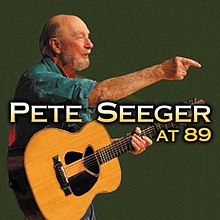
Peter Seeger was an American folk singer-songwriter, musician and social activist. He was a fixture on nationwide radio in the 1940s, and had a string of hit records in the early 1950s as a member of The Weavers, notably their recording of Lead Belly's "Goodnight, Irene," which topped the charts for 14 weeks in 1950. Members of the Weavers were blacklisted during the McCarthy Era. In the 1960s, Seeger re-emerged on the public scene as a prominent singer of protest music in support of international disarmament, civil rights, workers' rights, counterculture, environmental causes, and ending the Vietnam War.
The Weavers were an American folk music quartet based in the Greenwich Village area of New York City originally consisting of Lee Hays, Pete Seeger, Ronnie Gilbert, and Fred Hellerman. Founded in 1948, the group sang traditional folk songs from around the world, as well as blues, gospel music, children's songs, labor songs, and American ballads. The group sold millions of records at the height of their popularity, including the first folk song to reach No. 1 on popular music charts, their recording of Lead Belly's "Goodnight, Irene."

Holly Near is an American singer-songwriter, actress, teacher, and activist.

"Goodnight, Irene" or "Irene, Goodnight," is a 20th-century American folk standard, written in 3
4 time, first recorded by American blues musician Huddie 'Lead Belly' Ledbetter in 1933. A version recorded by The Weavers was a #1 hit in 1950. Pete Seeger of The Weavers has characterized it as Lead Belly's "theme song."

Whale Music is a 1992 studio album by Canadian rock band Rheostatics. It should not be confused with the soundtrack to the film Whale Music, which was also composed by the band and released in 1994.

Tékitoi is a studio album released in 2004 by the Algerian musician Rachid Taha. The title is a nonstandard spelling of the French question "Tu es qui, toi?" which might be pronounced in speech as "T'es qui, toi?" and, in the context of this song, means "Who do you think you are?" informally.
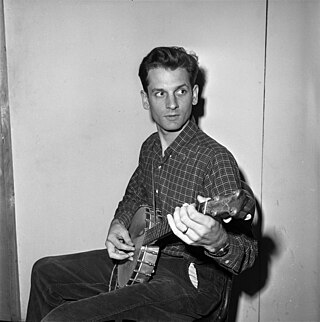
Mike Seeger was an American folk musician and folklorist. He was a distinctive singer and an accomplished musician who mainly played autoharp, banjo, fiddle, dulcimer, guitar, harmonica, mandolin, dobro, jaw harp, and pan pipes. Seeger, a half-brother of Pete Seeger, produced more than 30 documentary recordings, and performed in more than 40 other recordings. He desired to make known the caretakers of culture that inspired and taught him. He was posthumously inducted into the International Bluegrass Music Hall of Fame in 2018.

The 48th Annual Grammy Awards took place on February 8, 2006, at the Staples Center in Los Angeles, California honoring the best in music for the recording year beginning from October 1, 2004, through September 30, 2005. Irish rock band U2 were the main recipients with five awards including Album of the Year. Mariah Carey, John Legend, and Kanye West were each nominated for eight awards and won three; Alison Krauss & Union Station also won three awards; and Kelly Clarkson won two. Green Day were amongst the big winners, winning the Grammy Award for Record of the Year.
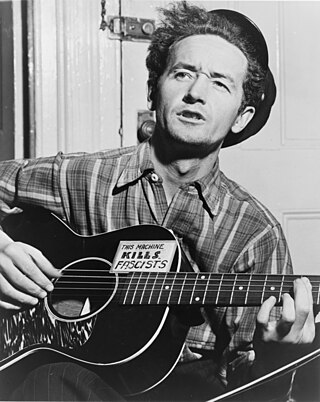
The American folk music revival began during the 1940s and peaked in popularity in the mid-1960s. Early folk music performers include Woody Guthrie, Lead Belly, Pete Seeger, Ewan MacColl (UK), Richard Dyer-Bennet, Oscar Brand, Jean Ritchie, John Jacob Niles, Susan Reed, Mississippi John Hurt, Josh White, and Cisco Houston. Lead Belly recorded "Cotton Fields" and "Goodnight, Irene" and folk singer Odetta released folk albums. New folk musicians such as Bob Dylan, Neil Young, Joni Mitchell, Peter Paul & Mary, Joan Baez, Martin Carthy (UK) and Dick Gaunghan (UK) recorded 60s, 70s folk songs. The revival brought forward styles of American folk music that had in earlier times contributed to the development of country and western, bluegrass, blues, and rock and roll music.
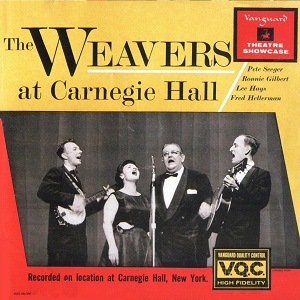
The Weavers at Carnegie Hall (1957) is the second album by the Weavers. The concert was recorded live at Carnegie Hall in New York City on Christmas Eve 1955. At the time the concert was a comeback for the group following the inclusion of the group on the entertainment industry blacklist. The album peaked at number 24 on the Billboard Top 200 in 1961.

Milagro is the eighth studio album by Contemporary Christian music singer Jaci Velasquez. The album was released by Sony Discos on April 1, 2003. This record won a Billboard Latin Music Award in the category "Best Christian Album". Although lyrically considered the most secular of all her works, the album was not as successful as her previous Spanish works due to Sony Discos changing hands in management that same year and a lack of promotion. The album was nominated at the Latin Grammy Award for Best Female Pop Vocal Album at the 5th Annual Latin Grammy Awards, losing to De Mil Colores by Rosario.

"Aunt" Samantha Bumgarner was an American early country and folk music performer and singer from Dillsboro, North Carolina. She won much praise for her work with the fiddle and banjo. In 1924, accompanied by guitarist Eva Davis, she traveled to New York City and recorded about a dozen songs for Columbia Records. The recordings are also notable for being the first use of a 5-string banjo on a recording. She was a yearly staple at Bascom Lamar Lunsford's Mountain Dance and Folk Festival from 1928 until shortly before her death.

College Concert is the twelfth album by the American folk music group the Kingston Trio, released in 1962. It was the group's third live release and the first live release with new member John Stewart. College Concert peaked at number three on the Billboard charts and was the largest-selling release by the Stewart-years Trio.
The Sessions Band is an American musical group that has periodically recorded and toured with American rock singer-songwriter Bruce Springsteen in various formations since 1997.
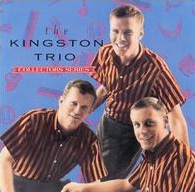
Capitol Collectors Series is a compilation album of the American folk music group the Kingston Trio's recordings from their time with the Capitol Records label. It contains songs from both the Dave Guard and John Stewart trios. All the songs included were released as singles by the group with two having never appeared on any of their principal recordings.

An Evening with The Kingston Trio is a live album by the American folk music group the Kingston Trio, recorded in 1962 and released in 1994. At the time of the performance, the group consisted of Bob Shane, Nick Reynolds, and John Stewart.
"Cumberland Gap" is an Appalachian folk song that likely dates to the latter half of the 19th century and was first recorded in 1924. The song is typically played on banjo or fiddle, and well-known versions of the song include instrumental versions as well as versions with lyrics. A version of the song appeared in the 1934 book, American Ballads and Folk Songs, by folk song collector John Lomax. Woody Guthrie recorded a version of the song at his Folkways sessions in the mid-1940s, and the song saw a resurgence in popularity with the rise of bluegrass and the American folk music revival in the 1950s. In 1957, the British musician Lonnie Donegan had a No. 1 UK hit with a skiffle version of "Cumberland Gap".
"Boil Them Cabbage Down" is an American folk song. Hoecakes are small cornmeal cakes that were cooked on a type of iron pan called a hoe. A breakfast of hoecakes and cabbage soup testifies to the humble origins of this song. According to Alan Lomax, musicologist and folklorist formerly of the Library of Congress, this tune was originally associated with African slaves brought from Niger.

Occupy This Album: 99 Songs for the 99 Percent is a four-disc compilation box set released in May 2012 through the record label Music for Occupy. The album concept, and initial production was initiated by Executive Producer Jason Samel. Jason Samel later recruited Producers Maegan Hayward, Alex Emanuel and Shirley Menard to assist with the project. The set consists of 99 songs inspired by or related to the Occupy movement. Proceeds from the album went "directly towards the needs of sustaining this growing movement."
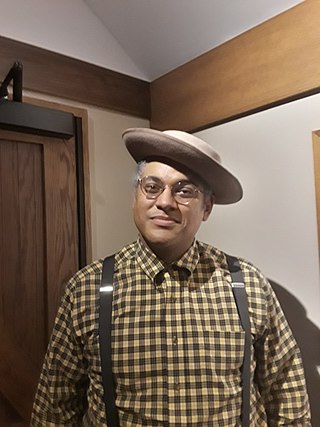
Dominique Flemons is an American old-time music, Piedmont blues, and neotraditional country multi-instrumentalist, singer, and songwriter. He is a proficient player of the banjo, fife, guitar, harmonica, percussion, quills, and rhythm bones. He is known as "The American Songster" as his repertoire of music spans nearly a century of American folklore, ballads, and tunes. He has performed with Mike Seeger, Joe Thompson, Martin Simpson, Boo Hanks, Taj Mahal, Old Crow Medicine Show, Guy Davis, and The Reverend Peyton's Big Damn Band.
